#Macedonian tombs
Note
Hi Dr Reames!
Would you say that Macedon shared the same "political culture" with its Thracian and Illyrian neighbours, like how most Greeks shared the polis structure and the concept of citizenship?
I don't really know anything about Macedonian history before Philip II's time, but you've often brought up how the Macedonians shared some elements of elite culture (e.g. mound burials) with their Thracian neighbours, as well religious beliefs and practices.
I've only ever heard these people generically described as "a collection of tribes (that confederated into a kingdom)", which also seems to be the common description for nearby "Greek" polities like Thessaly and Epiros. So did these societies have a lot in common, structurally speaking, with Macedon? Or were they just completely different types of polities altogether?
First, in the interest of some good bibliography on the Thracians:
Z. H. Archibald, The Odrysian Kingdom of Thrace. Orpheus Unmasked. Oxford UP, 1998. (Too expensive outside libraries, but highly recommended if you can get it by interlibrary loan. Part of the exorbitant cost [almost $400, but used for less] owes to images, as it’s archaeology heavy. Archibald is also an expert on trade and economy in north Greece and the Black Sea region, and has edited several collections on the topic.
Alexander Fol, Valeria Fol. Thracians. Coronet Books, 2005. Also expensive, if not as bad, and meant for the general public. Fol’s 1977 Thrace and the Thracians, with Ivan Marazov, was a classic. Fol and Marazov are fathers of modern Thracian studies.
R. F. Hodinott, The Thracians. Thames and Hudson, 1981. Somewhat dated now but has pictures and can be found used for a decent price if you search around. But, yeah…dated.
For Illyria, John Wilkes’ The Illyrians, Wiley-Blackwell, 1996, is a good place to start, but there’s even less about them in book form (or articles).
—————
Now, to the question.
BOTH the Thracians and Illyrians were made up of politically independent tribes bound by language and religion who, sometimes, also united behind a strong ruler (the Odrysians in Thrace for several generations, and Bardylis briefly in Illyria). One can probably make parallels to Germanic tribes, but it’s easier for me to point to American indigenous nations. The Odrysians might be compared to the Iroquois federation. The Illyrians to the Great Lakes people, united for a while behind Tecumseh, but not entirely, and disunified again after. These aren’t perfect, but you get the idea. For that matter, the Greeks themselves weren’t a nation, but a group of poleis bonded by language, culture, and religion. They fought as often as they cooperated. The Persian invasion forced cooperation, which then dissolved into the Peloponnesian War.
Beyond linguistic and religious parallels, sometimes we also have GEOGRAPHIC ones. So, let me divide the north into lowlands and highlands. It’s much more visible on the ground than from a map, but Epiros, Upper Macedonia, and Illyria are all more alike, landscape-wise, than Lower Macedonia and the Thracian valleys. South of all that, and different yet again, lay Thessaly, like a bridge between Southern Greece and these northern regions.
If language (and religion) are markers of shared culture, culture can also be shaped by ethnically distinct neighbors. Thracians and Macedonians weren’t ethnically related, yet certainly shared cultural features. Without falling into colonialist geographical/environmental determinism, geography does affect how early cultures develop because of what resources are available, difficulties of travel, weather, lay of the land itself, etc.
For instance, the Pindus Range, while not especially high, is rocky and made a formidable barrier to easy east-west travel. Until recently, sailing was always more efficient in Greece than travel by land (especially over mountain ranges).* Ergo, city-states/towns on the western coast tended to be western-facing for trade, and city-states/towns on the eastern side were, predictably, eastern-facing. This is why both Epiros and Ainai (Elimeia) did more trade with Corinth than Athens, and one reason Alexandros of Epiros went west to Italy while Alexander of Macedon looked east to Persia. It’s also why Corinth, Sparta, etc., in the Peloponnese colonized Sicily and S. Italy, while Athens, Euboia, etc., colonized the Asia Minor and Black Sea coasts. (It’s not an absolute, but one certainly sees trends.)
So, looking at their land, we can see why Macedonians and Thracians were both horse people with their wide valleys. They also practiced agriculture, had rich forests for logging, and significant metal (and mineral) deposits—including silver and gold—that made mining a source of wealth. They shared some burial customs but maintained acute differences. Both had lower status for women compared to Illyria/Epiros/Paionia. Yet that’s true only of some Thracian tribes, such as the Odrysians. Others had stronger roles for women. Thracians and Macedonians shared a few deities (The Rider/Zis, Dionysos/Zagreus, Bendis/Artemis/Earth Mother), although Macedonian religion maintained a Greek cast. We also shouldn’t underestimate the impact of Greek colonies along the Black Sea coast on inland Thrace, especially the Odrysians. Many an Athenian or Milesian (et al.) explorer/merchant/colonist married into the local Thracian elite.
Let’s look at burial customs, how they’re alike and different, for a concrete example of this shared regional culture.
First, while both Thracians and Macedonians had shrines, neither had temples on the Greek model until late, and then largely in Macedonia. Their money went into the ground with burials.
Temples represent a shit-ton of city/community money plowed into a building for public use/display. In southern Greece, they rise (pun intended) at the end of the Archaic Age as city-state sumptuary laws sought to eliminate personal display at funerals, weddings, etc. That never happened in Macedonia/much of the northern areas. So, temples were slow to creep up there until the Hellenistic period. Even then, gargantuan funerals and the Macedonian Tomb remained de rigueur for Macedonian elite. (The date of the arrival of the true Macedonian Tomb is debated, but I side with those who count it as a post-Alexander development.)
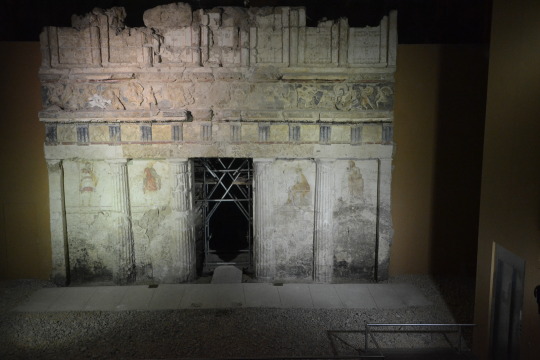
A “Macedonian Tomb” (above: Tomb of Judgement, photo mine) is a faux-shrine embedded in the ground. Elite families committed wealth to it in a huge potlatch to honor the dead. Earlier cyst tombs show the same proclivities, but without the accompanying shrine-like architecture. As early as 650 BCE at Archontiko (= ancient Pella), we find absurd amounts of wealth in burials (below: Archontiko burial goods, Pella Museum, photos mine). Same thing at Sindos, and Aigai, in roughly the same period. Also in a few places in Upper Macedonia, in the Archaic Age: Aiani, Achlada, Trebenište, etc.. This is just the tip of the iceberg. If Greece had more money for digs, I think we’d find additional sites.
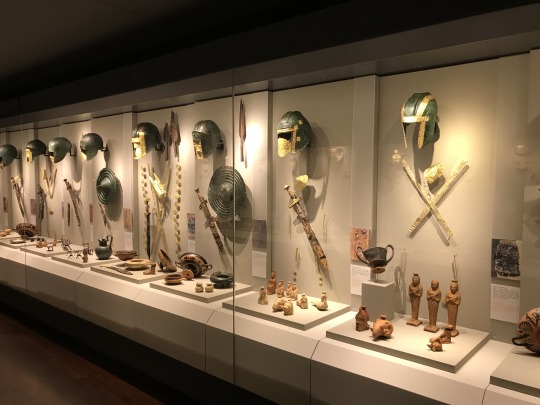

Vivi Saripanidi has some great articles (conveniently in English) about these finds: “Constructing Necropoleis in the Archaic Period,” “Vases, Funerary Practices, and Political Power in the Macedonian Kingdom During the Classical Period Before the Rise of Philip II,” and “Constructing Continuities with a Heroic Past.” They’re long, but thorough. I recommend them.
What we observe here are “Princely Burials” across lingo-ethnic boundaries that reflect a larger, shared regional culture. But one big difference between elite tombs in Macedonia and Thrace is the presence of a BODY, and whether the tomb was new or repurposed.
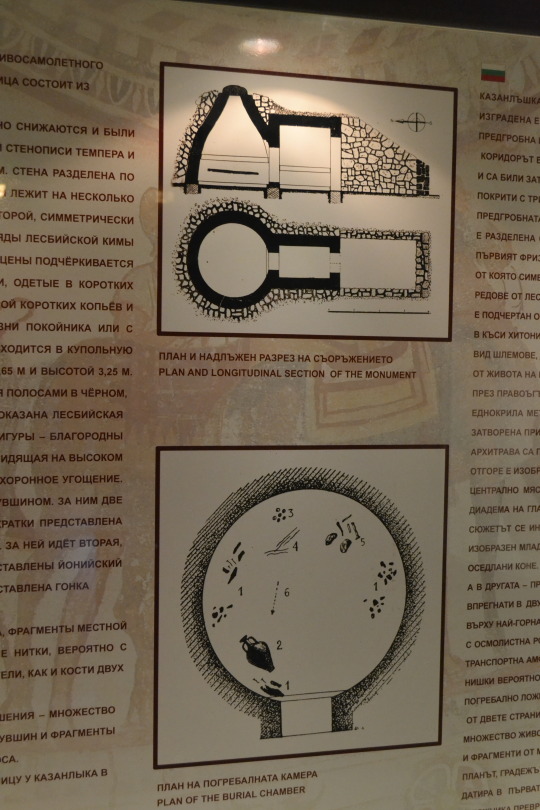

In Thrace, at least royal tombs are repurposed shrines (above: diagram and model of repurposed shrine-tombs). Macedonian Tombs were new construction meant to look like a shrine (faux-fronts, etc.). Also, Thracian kings’ bodies weren’t buried in their "tombs." Following the Dionysic/ Orphaic cult, the bodies were cut up into seven pieces and buried in unmarked spots. Ergo, their tombs are cenotaphs (below: Kosmatka Tomb/Tomb of Seuthes III, photos mine).

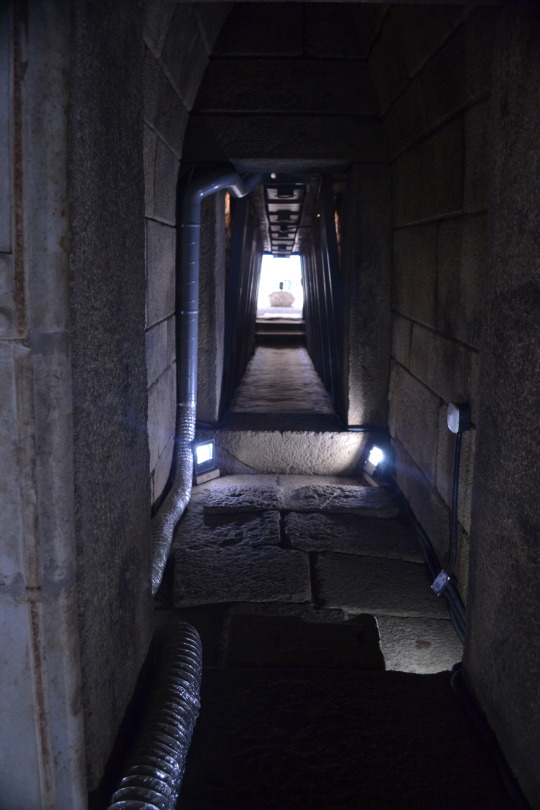
What they shared was putting absurd amounts of wealth into the ground in the way of grave goods, including some common/shared items such as armor, golden crowns, jewelry for women, etc. All this in place of community-reflective temples, as seen in the South. (Below: grave goods from Seuthes’ Tomb; grave goods from Royal Tomb II at Vergina, for comparison).



So, if some things are shared, others (connected to beliefs about the afterlife) are distinct, such as the repurposed shrine vs. new construction built like a shine, and the presence or absence of a body (below: tomb ceiling décor depicting Thracian deity Zalmoxis).

Aside from graves, we also find differences between highlands and lowlands in the roles of at least elite women. The highlands were tough areas to live, where herding (and raiding) dominated, and what agriculture there was required “all hands on deck” for survival. While that isn’t necessary for women to enjoy higher status (just look at Minoan Crete, Etruria, and even Egypt), it may have contributed to it in these circumstances.
Illyrian women fought. And not just with bows on horseback as Scythian women did. If we can believe Polyaenus, Philip’s daughter Kyanne (daughter of his Illyrian wife Audata) opposed an Illyrian queen on foot with spears—and won. Philip’s mother Eurydike involved herself in politics to keep her sons alive, but perhaps also as a result of cultural assumption: her mother was royal Lynkestian but her father was (perhaps) Illyrian. Epirote Olympias came to Pella expecting a certain amount of political influence that she, apparently, wasn’t given until Philip died. Alexander later observed that his mother had wisely traded places with Kleopatra, his sister, to rule in Epiros, because the Macedonians would never accept rule by a woman (implying the Epirotes would).
I’ve noted before that the political structure in northern Greece was more of a continuum: Thessaly had an oligarchic tetrarchy of four main clans, expunged by Jason in favor of tyranny, then restored by Philip. Epiros was ruled by a council who chose the “king” from the Aiakid clan until Alexandros I, Olympias’s brother, established a real monarchy. Last, we have Macedon, a true monarchy (apparently) from the beginning, but also centered on a clan (Argeads), with agreement/support from the elite Hetairoi class of kingmakers. Upper Macedonian cantons (formerly kingdoms) had similar clan rule, especially Lynkestis, Elimeia, and Orestis. Alas, we don’t know enough to say how absolute their monarchies were before Philip II absorbed them as new Macedonian districts, demoting their basileis (kings/princes) to mere governors.
I think continued highland resistance to that absorption is too often overlooked/minimized in modern histories of Philip’s reign, excepting a few like Ed Anson’s. In Dancing with the Lion: Rise, I touch on the possibility of highland rebellion bubbling up late in Philip’s reign but can’t say more without spoilers for the novel.
In antiquity, Thessaly was always considered Greek, as was (mostly) Epiros. But Macedonia’s Greek bona-fides were not universally accepted, resulting in the tale of Alexandros I’s entry into the Olympics—almost surely a fiction with no historical basis, fed to Herodotos after the Persian Wars. The tale’s goal, however, was to establish the Greekness of the ruling family, not of the Macedonian people, who were still considered barbaroi into the late Classical period. Recent linguistic studies suggest they did, indeed, speak a form of northern Greek, but the fact they were regarded as barbaroi in the ancient world is, I think instructive, even if not necessarily accurate.
It tells us they were different enough to be counted “not Greek” by some southern Greek poleis and politicians such as Demosthenes. Much of that was certainly opportunistic. But not all. The bias suggests Macedonian culture had enough overflow from their northern neighbors to appear sufficiently alien. Few Greek writers suggested the Thessalians or Epirotes weren’t Greek, but nobody argued the Thracians, Paiones, or Illyrians were. Macedonia occupied a liminal status.
We need to stop seeing these areas with hard borders and, instead, recognize permeable boundaries with the expected cultural overflow: out and in. Contra a lot of messaging in the late 1800s and early/mid-1900s, lifted from ancient narratives (and still visible today in ultra-national Greek narratives), the ancient Greeks did not go out to “civilize” their Eastern “Oriental” (and northern barbaroi) neighbors, exporting True Culture and Philosophy. (For more on these views, see my earlier post on “Alexander suffering from Conqueror’s Disease.”)
In fact, Greeks of the Late Iron Age (LIA)/Archaic Age absorbed a great deal of culture and ideas from those very “Oriental barbarians,” such as Lydia and Assyria. In art history, the LIA/Early Archaic Era is referred to as the “Orientalizing Period,” but it’s not just art. Take Greek medicine. It’s essentially Mesopotamian medicine with their religion buffed off. Greek philosophy developed on the islands along the Asia Minor coast, where Greeks regularly interacted with Lydians, Phoenicians, and eventually Persians; and also in Sicily and Southern Italy, where they were talking to Carthaginians and native Italic peoples, including Etruscans. Egypt also had an influence.
Philosophy and other cultural advances didn’t develop in the Greek heartland. The Greek COLONIES were the happenin’ places in the LIA/Archaic Era. Here we find the all-important ebb and flow of ideas with non-Greek peoples.
Artistic styles, foodstuffs, technology, even ideas and myths…all were shared (intentionally or not) via TRADE—especially at important emporia. Among the most significant of these LIA emporia was Methone, a Greek foundation on the Macedonian coast off the Thermaic Gulf (see map below). It provided contact between Phoenician/Euboian-Greek traders and the inland peoples, including what would have been the early Macedonian kingdom. Perhaps it was those very trade contacts that helped the Argeads expand their rule in the lowlands at the expense of Bottiaians, Almopes, Paionians, et al., who they ran out in order to subsume their lands.
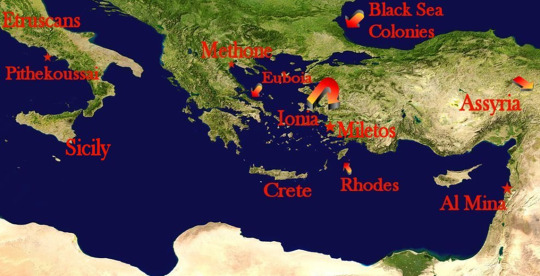
My main point is that the northern Greek mainland/southern Balkans were neither isolated nor culturally stunted. Not when you look at all that gold and other fine craftwork coming out of the ground in Archaic burials in the region. We’ve simply got to rethink prior notions of “primitive” peoples and cultures up there—notions based on southern Greek narratives that were both political and culturally hidebound, but that have, for too long, been taken as gospel truth.
Ancient Macedon did not “rise” with Philip II and Alexander the Great. If anything, the 40 years between the murder of Archelaos (399) and the start of Philip’s reign (359/8) represents a 2-3 generation eclipse. Alexandros I, Perdikkas II, and Archelaos were extremely capable kings. Philip represented a return to that savvy rule.
(If you can read German, let me highly recommend Sabine Müller’s, Perdikkas II and Die Argeaden; she also has one on Alexander, but those two talk about earlier periods, and especially her take on Perdikkas shows how clever he was. For those who can’t read German, the Lexicon of Argead Macedonia’s entry on Perdikkas is a boiled-down summary, by Sabine, of the main points in her book.)
Anyway…I got away a bit from Thracian-Macedonian cultural parallels, but I needed to mount my soapbox about the cultural vitality of pre-Philip Macedonia, some of which came from Greek cultural imports, but also from Thrace, Illyria, etc.
Ancient Macedonia was a crossroads. It would continue to be so into Roman imperial, Byzantine, and later periods with the arrival of subsequent populations (Gauls, Romans, Slavs, etc.) into the region.
That fruit salad with Cool Whip, or Jello and marshmallows, or chopped up veggies and mayo, that populate many a family reunion or church potluck spread? One name for it is a “Macedonian Salad”—but not because it’s from Macedonia. It’s called that because it’s made up of many [very different] things. Also, because French macedoine means cut-up vegetables, but the reference to Macedonia as a cultural mishmash is embedded in that.
---------------
* I’ve seen this personally between my first trip to Greece in 1997, and the new modern highway. Instead of winding around mountains, the A2 just blasts through them with tunnels. The A1 (from Thessaloniki to Athens) was there in ’97, and parts of the A2 east, but the new highway west through the Pindus makes a huge difference. It takes less than half the time now to drive from the area around Thessaloniki/Pella out to Ioannina (near ancient Dodona) in Epiros. Having seen the landscape, I can imagine the difficulties of such a trip in antiquity with unpaved roads (albeit perhaps at least graded). Taking carts over those hills would be daunting. See images below.

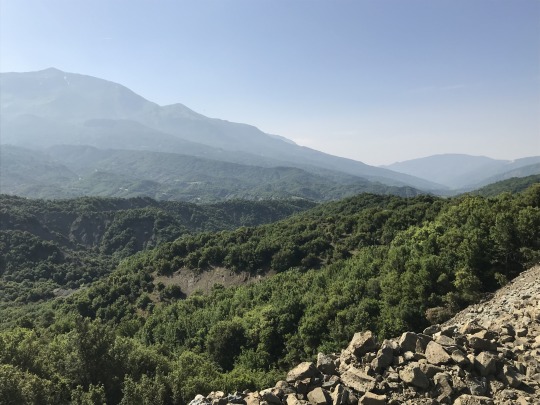
#asks#ancient Macedonia#ancient Thrace#ancient Epiros#ancient Thessaly#Argead Macedonia#pre-Philip Macedonia#Late Iron Age Greece#Archaic Age Greece#Thracian tombs#Macedonian tombs#Classics#tagamemnon#Alexander the Great#Philip II of Macedon#Philip of Macedon#women in ancient Macedonia#ancient Illyria#women in Illyria#Macedonian-Thracian similarities#religion in ancient Thrace#religion in ancient Macedonia
13 notes
·
View notes
Text

Capriccio of Classical Ruins with Alexander the Great Opening the Tomb of Achilles
by Giovanni Niccolo Servandoni
#alexander the great#achilles#tomb#classical#ruins#art#giovanni niccolo servandoni#history#ancient#capriccio#europe#european#architecture#landscape#soldiers#ancient greek#macedonian#macedonian empire#macedonia#macedonian army#macedon#greek#greece#ancient greece#sculptures#sculpture#statues#statue#pyramids#pyramid
194 notes
·
View notes
Text
The stunning Tomb of Lyson and Kallikles was found in the 1940s and is somewhat of an enigma. Aside from the beautiful nature of the decoration, the curiosity is that the tomb is Macedonian, but the style is Roman. What is the cross-over?
13 notes
·
View notes
Note
Dark! Platonic Alexander the Great x illegitimate! Daughter reader?
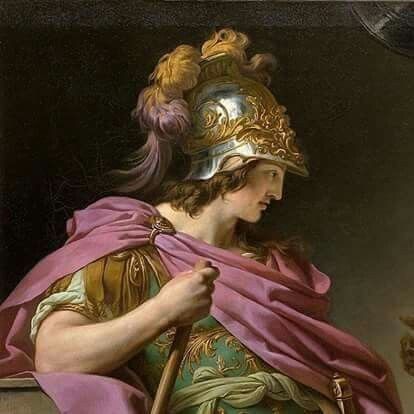
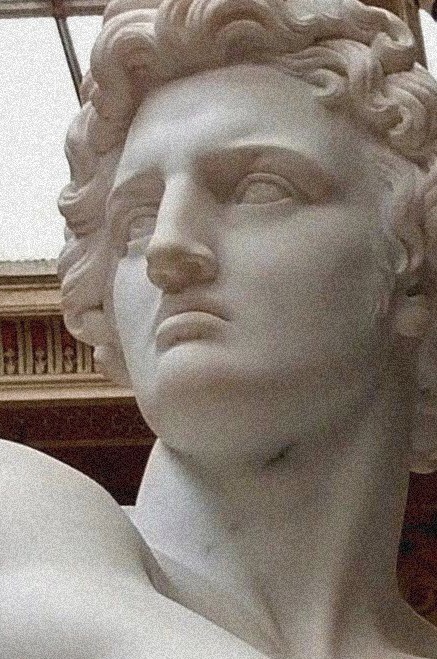

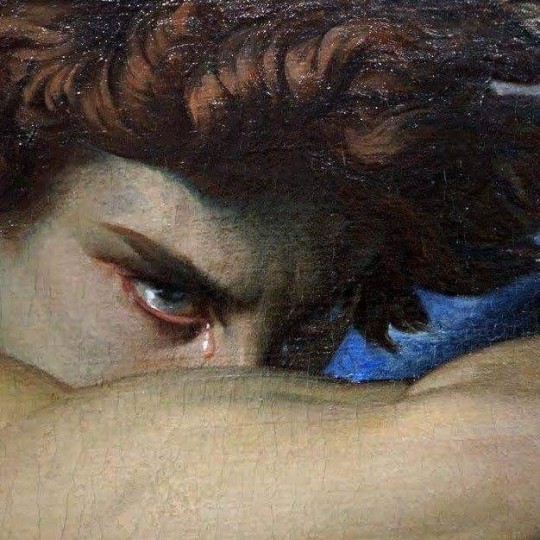
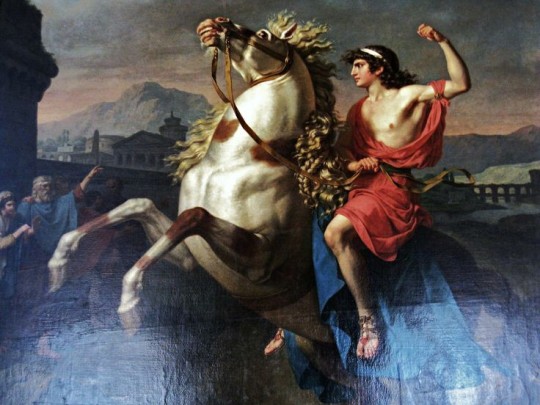
He had you when he was really young, barely fifteen years old.
Even though many men back then had children younger than his age.
Alexander didn't give you up, in fact, he insisted that you stay by his side, not caring for the criticism lashed towards him.
Not only that, but also tried to convince his father to legalizes you.
But his father refused to do so.
However, when King Philip II gets assassinated, and your father becomes king at twenty-one, the first thing he does is claim you as his true-born child.
For the Macedonian Greek king, you were not just a child related to him by blood...
You are the daughter he spends long nights telling about his glorious fights and hunts.
Unlike his father who belittles his achievements, you always seem excited to listen to him.
Also, you have the same interests as him, you love to always learn and improve even as a young child.
Alexander decided to bring you with him on his conquests, even though his mother, Olympias objected to the idea, stating that war is no place for a girl.
But your father insisted that you shall come with him because you are his daughter.
Of course, he kept you protected away from the battle field.
One time, Cleitus, one of the generals, flirted with you during the celebration of one of your father's victories.
Alexander got word of that and killed his friend with his own hands in drunken fury.
As years pass by, your health becomes more frail, and you start to pass out during long journeys.
Alexander appointed the highest physicians to cure you, but they failed to even find out what is making you so weak in the first place.
On your deathbed, you keep mumbling your father's name while Alexander keeps holding your hand, pleading for his gods to save you.
"Father...Father"
"Don't leave your father alone, (Y/n), don't be so cruel" the conqueror choked out the words, with tears falling down his face
But unfortunately, you passed away at the age of seventeen, leaving your father heartbroken and feeling great guilt.
Alexander also died a few months later from typhoid fever.
His last request was that they move your body to his tomb, so he can find you again in the afterlife.
1K notes
·
View notes
Note
Don't know if they are specific articles about it but do you know why ancient Greeks during the classical period didn't make frescoes like the Minoan civilization?
They did make frescoes but few have survived because few buildings survived intact. Most frescoes surviving now, aside from the ones in well preserved Minoan ruins, are ones in Macedonian tombs (~ 5th-2nd c. BC). The more “closed” structure helped them remain in better condition, I assume. Of course the art style on the frescoes at this point resembled Classical or Hellenistic Greek way more than Minoan, Mycenaean or even Archaic Greek. Art often evolves and changes and does not return to previous forms.
Maybe some art historian would know more about it, perhaps @thrassa and @margaretartstuff could have some input in this.

Fresco from Agios Athanasios, Thessaloniki, 4th c. BC.
191 notes
·
View notes
Text
Burden of Truth (Book 1) Chapter Eleven
Father Figure! Marc Spector x Teen! Reader
Father Figure! Steven Grant x Teen! Reader
Mother Figure! Layla El-Faouly x Teen! Reader
Chapter Eleven: At the Sarcophagus
Summary: (Y/N) and Steven find the Sarcophagus of Ammit's Avatar, but Harrow finds it, too.
Mouse Note: Listen...I can't say I'm sorry, but, uh, yeah.
(Y/N) and Steven continued on their way through the new tunnel. It was a bit caved in with bits of rock fallen in their way, but nothing impeded them severely. Finally, they rounded a corner, and another chamber opened up.
“Oh my stars,” said Steven.
“My god,” said (Y/N).
They stared at the room, lit by a ray of sunshine reflected off pools and trickles of water. Stepping over rocks, they approached the burial chamber of the pharaoh. Statues and murals lined the walls, and the sarcophagus itself stood on a dais in the center of the room.
Steven stared at the artifacts. “Thutmose III. Nefertiti. It’s gotta be one of the big ones.”
“You nearly kissed her,” said Marc, and Steven stumbled.
“Steven?” asked (Y/N).
“Just Marc talking,” said Steven, trying to ignore him as they continued.
(Y/N) frowned and looked at his reflection in the water. They wished they could still hear Marc. It was lonelier without him. They wished they could be with Layla, Steven, and Marc all together again.
“I should try to drown you or punch you again,” said Marc. “But you also told her the truth about why I’ve been pushing her away. And that was unexpected. And you protected (Y/N).” So he wouldn’t try to hit Steven.
“Are these Macedonian?” said (Y/N), unknowingly interrupting the conversation. They knelt by the relics and murals. “I can’t remember these symbols or translate them, but these are Macedonian, aren’t they?”
Steven knelt next to them. “No way. That’s impossible. Only one pharaoh…But he called himself Egyptian.”
(Y/N)’s eyes widened. “No way. No way. Is this really…?”
“I think we’re looking at the long-lost tomb of Alexander the Great,” breathed Steven, giddy and reverent all at once.
(Y/N) stared at it. “…Oh god. We have to open the sarcophagus.” It felt wrong to disturb the tomb, but this was Ammit’s tomb. Alexander the Great had been her Avatar. She needed to be stopped. Harrow needed to be stopped.
“That just feels wrong,” groaned Steven. “Everything inside of me is screaming not to open this thing.”
“You want Harrow to get to Ammit first?” said Marc.
“Of course I don’t want him to get to Ammit,” said Steven.
“Marc again?” said (Y/N).
“Yeah,” said Steven. He looked at (Y/N). “Ready?”
“As I’ll ever be,” said (Y/N).
Steven nodded. Together, they put their hands on the lid of the sarcophagus and pushed. It was tough going, but they managed to shit the top end of the lid off enough so that they could see the mummy within. This was the Alexander the Great. In the flesh (literally, since he was a mummy).
“Where’s the ushabti?” said Marc.
“He’s not holding the ushabti,” said (Y/N) at the same moment, frowning.
Steven nearly smiled at the coincidence and answered both at once. “If you’re gonna hide it for all eternity, you’d probably put it in a place where the average looter wouldn’t think to look.”
(Y/N) coughed and pulled up their sleeves. “Um, I think I know where.”
“Where?” said Steven and Marc at the same time, though (Y/N) could only hear one.
“It’s the voice symbolism again,” said (Y/N), grimacing and gesturing to the wrapped head and throat of Alexander the Great.
“Oh. Oh, gross,” said Steven.
(Y/N) steeled themself, reached out, and pulled away the wrappings around Alexander the Great’s face. “I am so sorry,” they muttered to the mummy and the memory of their parents. They shouldn’t be disturbing a resting place like this. But it needed to be done.
“Oh…” Steven grimaced as (Y/N) slipped their hand into Alexander the Great’s mouth and reached into his throat.
Forcing themself not to retch, (Y/N) felt a wave of relief as they felt a stone sculpture. Grabbing it, they pulled it out. The sunlight illuminated the return of Ammit’s ushabti to the world.
“We found it,” breathed Steven.
“Good job, kid,” said Marc, unable to hold back the pride. He deflated as he remembered (Y/N) couldn’t hear him now.
(Y/N) nodded and smiled at Steven in relief.
Footsteps approached, and they tensed, whirling toward the passage. They relaxed as they saw it was Layla. She had made it.
“Layla, look!” said Steven proudly, gesturing to the ushabti in (Y/N)’s hands. “We won!” He laughed.
(Y/N) frowned. Layla’s eyes were narrowed, and her body was tense as she came closer. Something was off.
“(Y/N) had to reach down Alexander the Great’s throat, but we found it,” said Steven. He frowned as he finally saw Layla’s furious gaze. “You alright, love?”
“Can he hear me?” she snapped.
“Alexander? No, I don’t think so. God, I hope not,” chuckled Steven, trying to keep the good energy going.
Layla kept going. “What happened to my father?”
(Y/N) frowned and flinched. They didn’t like the feeling that was appearing in the room. Everything had been going fine. And now, now, something was wrong. (Y/N) stepped back.
Layla walked up to Steven. “I’m talking to you.”
“What?” asked Steven.
“I’m talking to you, Marc,” snapped Layla, trying to get him to come out and speak to her.
Steven frowned, his eyes rolled up, and when Layla had him looking at her again, it was Marc staring out. He had gotten control of the body.
“Come on, come on, let’s go,” said Marc, trying to take control of the situation and avoid the conversation. He took (Y/N)’s arm and Layla’s hand, but Layla pulled back.
“No,” she said forcefully.
“We need to go right now,” said Marc.
“What’s going on?” said (Y/N), pulling the end of their sleeves.
“Marc, no. No,” repeated Layla, refusing to go with him. “What happened to my father?!”
“Listen to me. We need to leave right now,” said Marc. “I will explain everything, I swear. But we have to go.”
“He’s telling the truth,” said (Y/N), trying to help but unsure of themself.
“No, I want to know now,” said Layla. She glared at Marc. “Did you kill Abdullah El Faouly?!”
(Y/N)’s eyes widened, and their gaze snapped to Marc. Their chest constricted as the terrible question was left in the air.
“Of course not. Of course I didn’t!” said Marc.
“He’s…He’s telling the truth,” said (Y/N). “He didn’t kill him, Layla.”
“But he was there,” said Layla, seeing that Marc was evading the whole truth. “Weren’t you?”
“Marc?” asked (Y/N), looking at him.
“I—” Marc couldn’t answer. Lying was impossible, but the truth was painful. It would destroy everything he’d built with Layla and whatever had started to grow between (Y/N) and Marc.
“Yeah, you were there,” said Layla. She could read him clearly.
Marc swallowed. Softly, he admitted the terrible truth. “I was there. Yeah. I was there.”
“Yeah. And how did he die?” snapped Layla.
(Y/N) covered their mouth and stepped back. “The mercenaries and the archaeologists.” What Fitzgerald and Kennedy had said in the car.
“Kid—” Marc reached out to them, but he let his hand drop. “I—My partner got greedy.” He spoke quietly, tiredly, as everything he’d never wanted to admit forced itself to the surface and destroyed what he’d built. “He executed everyone at the dig site. I tried to save your father, Layla, but I couldn’t. And I—”
Layla glared at him. “No. But you brought a killer right to him. Right?” She shoved him back, and Marc just took it.
He nodded helplessly, willing to take any abuse to make up for the terrible things he’d done. “Yeah. He shot me, too. I was supposed to die that night. But I didn’t die that night. And I should have.” Marc gazed at Layla with so much emotion as she wiped tears from her cheeks. “I’ve tried to tell you since the moment we met. But I just didn’t know how.”
Layla sobbed. Then, she froze. “Oh my god.”
“I’m sorry,” said Marc.
Layla turned on him. “That’s the reason we met.”
(Y/N)’s eyes widened, and they clutched the ushabti tightly.
“You just had a guilty conscience?” said Layla incredulously, and the way Marc stared back at her was answer enough.
“Layla—”
The sound of a rolling stone broke through the moment, and they all turned towards the passageway. The rustle of footsteps grew louder.
“They’re here,” said Marc in alarm.
“There must be another way out,” said Layla, wanting to stay alive to keep being angry.
“Okay, go, find it. Take (Y/N). I’ll hold them off,” said Marc, grabbing an ornamental axe from the sarcophagus.
At the same time, (Y/N) took their moment to go with Layla to stuff the ushabti into the backpack to hide it from sight. The moment that Layla darted to grab (Y/N), though, Harrow and his numerous armed men stepped into the room. Layla had to hide behind a column, and as (Y/N) tried to scramble back, a guard that had snuck around the side grabbed them. (Y/N) yelped. Marc’s eyes widened, and he took a step towards (Y/N) but froze as the guard held (Y/N) tightly and raised his gun. They kicked at him, but the man was stronger, and (Y/N) was stuck staring fearfully at Marc.
“Be gentle with them. They’re just misguided,” said Harrow to the guard.
(Y/N) and Marc’s eyes went to Harrow as he stood in the tomb with them. The scarab that had guided him there fell into his hand, the magic having done its job.
“Just you two, isn’t it?” said Harrow. “The rest is silence.” He strolled closer. “I remember the first morning I woke up knowing that Khonshu was gone. The quiet was liberating. You’re both free. And, of course, with that freedom comes choice. And right now, you both have a very important decision to make.”
Harrow walked towards (Y/N), and Marc tensed. He smiled at them, and (Y/N) flinched. “I know it’s been hard.” (Y/N) fought to avoid his gaze. “Being used by the gods. Pushed so far. Being so alone. But you can be alright, now.” They shook their head furiously. “You have nothing to worry about. You can let go of all the pain you feel. All the blame you feel.” He smiled kindly. “I know you think your parents’ death is your fault.” (Y/N)’s eyes widened, and they let out a sound akin to a whimper, a desperate plea for him to stop. “You asked for them to show you Egypt. You begged them to take you to the place they’d met, fallen in love, worked and learned. And then they died.” Harrow reached out and put a hand on (Y/N)’s head, and they winced back. “That’s alright.” He removed his hand and took theirs into his.
Marc and Layla’s eyes widened as the cane began to swing back and forth. (Y/N)’s soul was being judged.
“Stop it,” shouted Marc, taking a step forward, but the guns raised and pointed at him.
(Y/N) was tempted to shut their eyes as the scales tattoo weighed back and forth. Unable to avert their eyes, though, (Y/N) watched as it settled. Their eyes widened. The scales were green. Their soul had been deemed worthy.
Harrow smiled. “I knew I had a good feeling about you.” He took back his cane and gazed at (Y/N). They reluctantly looked up at him. “Now the choice lies before you. You have been deemed worthy. Ammit wants you on her side. You can help relieve the pain of so many. You can have a purpose.”
(Y/N) stared at him, that word pulling at them, twisted around their heart and lungs. Their eyes flicked to Marc, staring at them with such worry that they felt their heart stir despite the pressure on it. (Y/N) looked back at Harrow evenly.
“I will never join you or Ammit,” said (Y/N), the words as honest as could be.
Harrow sighed. “I’m disappointed. Nonetheless, I’m afraid I can’t let you and live freely just yet.” He smiled. “We need the ritual to release Ammit.”
(Y/N) froze, and their eyes widened. Long ago, Ma’at had taught them different rituals, bits of ancient magic that might one day be needed. One was to release the gods from ushabtis. (Y/N) hadn’t understood the significance then, nor had they questioned why Ma’at wanted them to learn it, but now that Ma’at was imprisoned, (Y/N) understood. Ma’at had known her actions in the mortal world could get her imprisoned. She had made sure the Avatar she had basically raised would be able to come and free her.
Unfortunately, now, that meant (Y/N) could also free Ammit.
“Leave them alone,” said Marc forcefully.
Harrow turned to him with a smile. “After I bring Ammit to this world and allow her to create a better one, (Y/N) can live a life free of danger and worry. I just need them for a little while longer.” Harrow gestured to them. “And you could be a part of that world, too. You just need to do the right thing.”
Marc looked at (Y/N) and then at all the armed men. He knew how to answer. He grabbed the gun of one man and dragged him closer. The man stumbled, and Marc slammed the axe onto his arm before he could shoot. He slashed at the next closest man, and then he threw the axe at Harrow.
One of his guards stepped it front and took the blow, loyal until death. The man fell, and Harrow pulled something from the man’s belt as the guard fell. Harrow looked evenly at Marc, raised the pistol, and shot.
Bang!
(Y/N) screamed as Marc stumbled back, blood pooling on his white shirt.
“Marc!” they cried, trying to pull away from the guard. “No! Marc, Steven!” They screamed for both desperately, tears burning at their eyes.
Harrow stepped up and raised the pistol again.
“Please, please, please, no!” shouted (Y/N).
Bang!
Behind the column, Layla covered her mouth as tears spilled down her cheeks. (Y/N) let out another agonized scream. The second wound bled instantly, and Marc fell back. He collapsed off the dais of the sarcophagus and landed in the pool of water.
“I can’t save anyone who won’t save themselves,” said Harrow, daring enough to be saddened.
(Y/N) let out a sob as Marc’s body lay in the water, unmoving. He was gone. Steven was gone. The tiny bit of good and warmth and connection (Y/N) had gathered in their life had been ripped away once again.
(Y/N) was alone.
Taglist:
@jaytheaceenby
@severussimp
@dmitrytherat
@slytherinroyalty16
@grippleback-galaxy
@alexpangender
@thewittyfanficreader
@aew-kun-age-regression
@oscarissac2099
@amberforest08
@kyalov
@yyourmotherr
@im-making-an-effort
@the-toskaverse
@wra-1-th
#burden of truth#x reader#x gn reader#gn reader#nb reader#x nb reader#x teen!reader#x teen reader#found family#found family trope#father figure#teen reader#teen!reader#platonic x reader#platonic#platonic moonknight#platonic moon knight#moonknight x reader#moonknight x teen!reader#moonknight x teen reader#moonknight#moon knight x teen reader#moon knight x teen!reader#moon knight x reader#moon knight#marvel moonknight#marvel moon knight#mcu#marvel x reader#marvel cinematic universe
47 notes
·
View notes
Text
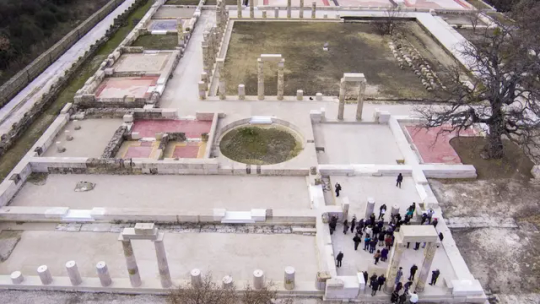
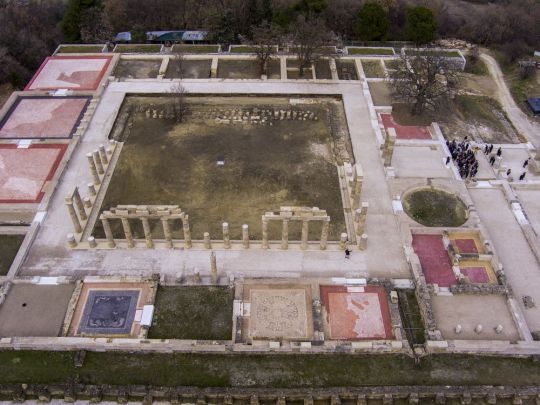
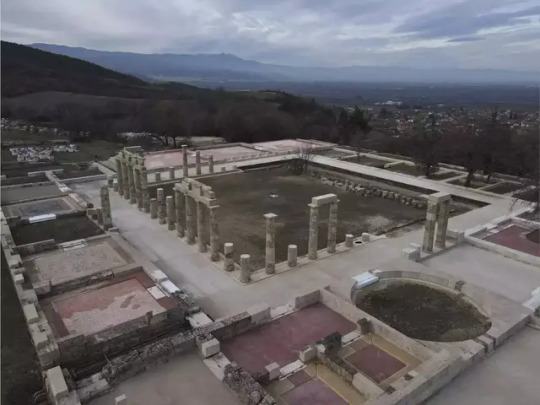
Greece Reopens the 2,400-Year-Old Palace Where Alexander the Great Was Crowned
The 2,300-year-old Palace of Aigai—the largest building in classical Greece—had been under renovation for 16 years.
On the day he was crowned king of Macedonia, Alexander the Great stood atop the intricately patterned marble floors of the Palace of Aigai. This week, the historic palace finally opened to the public after a 16-year-long restoration, report Derek Gatopoulos and Costas Kantouris of the Associated Press (AP).
At 160,000 square feet, the Palace of Aigai was classical Greece’s largest structure. Built primarily by Alexander’s father, Phillip II, in the fourth century B.C.E., it was the home of the Argead dynasty, ancient Macedonia’s ruling family. It was destroyed by the Romans in 148 B.C.E. and endured a subsequent series of lootings. Renovating and excavating this sprawling monument was a serious undertaking, costing over 20 million euros ($22 million).
The Greek government was able to maintain the “general appearance” of the site amid careful alterations to the monument’s towering marble columns, delicate mosaics and textured flooring, according to Xiaofei Xu and Chris Liakos. The palace once featured large column-lined courtyards, worship sites and expansive banquet halls, and its restoration presented a “three-dimensional jigsaw puzzle,” per the AP. Archaeologists solved it by combining stones from the structure’s ruins with replica parts to reproduce the original structures.
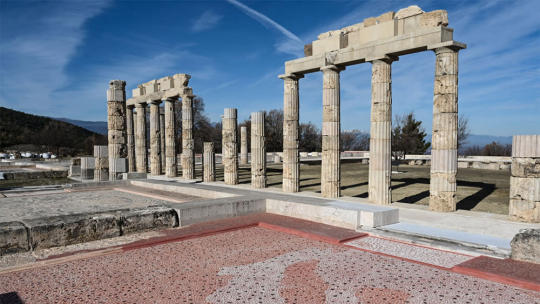
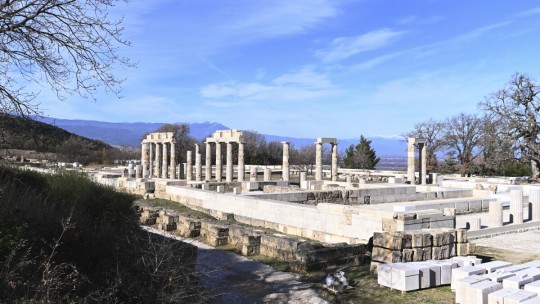
Archaeologist Angeliki Kottaridi started working on the renovation efforts as a university student. Overseeing the project’s progress over many years and contributing to its excavation and reconstruction, Kottardi became a leading figure in the project.
“What you discover is stones scattered in the dirt, and pieces of mosaics here and there,” Kottaridi told state television before an opening ceremony on Friday, per the AP. “Then you have to assemble things, and that’s the real joy of the researcher.”
The Palace of Aigai is located in northern Greece between what are now the towns of Palatitsia and Vergina. Its reopening builds on discoveries made in the late 1970s by Greek archaeologist Manolis Andronikos, who unearthed a cluster of royal Macedonian artifacts, including gold and silver ceremonial weapons and armor, and burials, one of which is thought to contain Phillip’s remains. The palace and its neighboring tombs are now a UNESCO World Heritage site.
Deeming it “among the most important archaeological sites in Europe,” UNESCO writes that the Palace of Aigai “represents an exceptional testimony to a significant development in European civilization, at the transition from the classical city state to the imperial structure of the Hellenistic and Roman periods.”
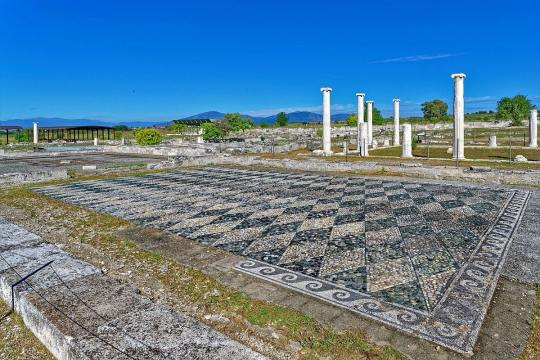
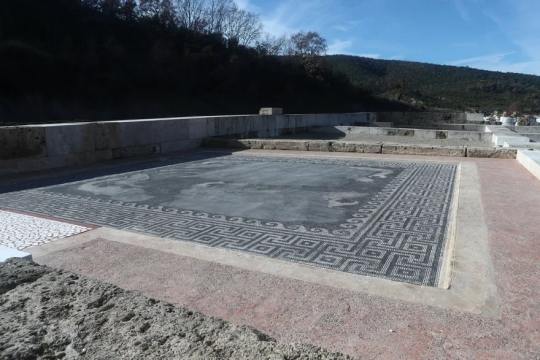
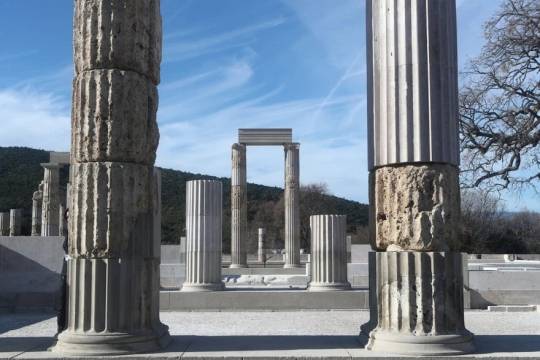
As the site of the first capital of the ancient kingdom of Macedonia, the Palace of Aigai signifies the onset of Alexander’s rule, which would stretch from Asia to the Middle East, and provides a crucial window into Macedonian culture.
“The importance of such monuments transcends local boundaries, becoming property of all humanity,” said Kyriakos Mitsotakis, Greece’s prime minister, at the inauguration event, per CNN. “And we as the custodians of this precious cultural heritage, we must protect it, highlight it, promote it and at the same time expand the horizons revealed by each new facet.”
By Catherine Duncan.
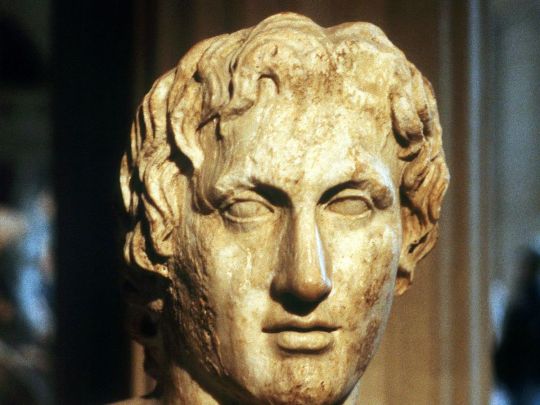
#Greece Reopens the 2400-Year-Old Palace Where Alexander the Great Was Crowned#Palace of Aigai#Argead dynasty#Phillip II#ancient artifacts#archeology#archeolgst#history#history news#ancient history#ancient culture#ancient civilizations#ancient macedonia#ancient greece#greek history#greek art
34 notes
·
View notes
Text
I think I've found a way out of the political situation in The Locked Tomb. One that doesn't lead to massive loss of life, and still dismantles the empire of the Nine Houses.
John didn't create anything with the intention of it surviving him. He seems to have gone out of his way to do the reverse, and only build things that would catastrophically self-destruct without him. Empires are already powder kegs, and based on the information in As Yet Unsent, John rigged this one to go up like the sun. Here's an excerpt of Judith reporting what she understands of BOE's arguments:
Their other line of attack is the business contracts. They claim that the services asked of them by the Emperor were set down in lifetime contracts by previous generations, who assumed the contracts would be terminated upon the Emperor's death.
If this is true, and we have no reason to assume it isn't, John has either intentionally or accidentally made himself into a latter-day Alexander; building an empire that will immediately crumble at his sudden death. This looks like it provides an easy solution: Kill the Emperor, terminate the contract, freedom for the peoples of the greater universe! Glory to the resistance!
Problem is, even assuming this doesn't amount to the fiery genocide of the Nine Houses—which I'm assuming is not the direction this series is going—there is no external state or government-in-exile prepared to take over where the Nine Houses left off. BOE is a militia group made up of isolated and conflicting factions, and the Houses have been incredibly successful at destroying political and cultural unity in their colonies. The sudden cessation of the empire would leave a huge power vacuum, New Rho writ large across the face of the universe.
And the Cohort would still be there. The neat crumbling of John's empire relies on the Cohort respecting the terms of these ancient contracts. Every admiral and general jockeying for power in the void left by the death of the emperor has to agree that yeah, the empire thing has been great, loved the military conquest, but now that we don't have an emperor anymore let's pack it all in and go home. That isn't what happened to Alexander's empire, and it's not what I see happening here. Alexander's empire dissolved into 40 years of civil war, eventually leading to the creation of four successor states still under Macedonian or Greek rule. Most likely something similar would happen in the empire of the Houses: the universe would dissolve into open war as the dominant military powers duked it out. The Cohort vs the Cohort vs BOE, with thousands of smaller powers allying with one side or another. Who knows what this would do for the politics back home—how factions would develop in relation to House loyalties, what Houses would survive the fallout, and so on—but for the larger empire it would be a bloodbath. We got a little taste of that in Canaan House, when Judith and Marta tried to impose military rule.
This isn't an argument for the status quo, though I do see how the people most likely to die in the ensuing chaos would disagree. Then again, some wouldn't. The deadly blast of an empire imploding is still better than endless death and exploitation under colonial rule, right? But we're still looking at catastrophic loss of life, and we can only hope that when the dust eventually settles, whatever comes next will be better, and not just successor states under Cohort control.
Which brings me back to the ray of hope I see in this clusterfuck of a situation: Kiriona Gaia. Heir to the Emperor Divine.
Six months ago, John had something else in common with Alexander the Great: no clear line of succession. Now he has a publicly declared and recognized heir, and that gives the Nine Houses an off-ramp into peaceful dissolution. It wouldn't be too difficult for her to step into the role, especially if Ianthe and Sarpedon back her. No one is anticipating that the Emperor will ever die, so the leaders would want a figurehead to gather around for stability.
Once Kiriona's in power, she can start a controlled demolition eventually ending in her abdication. She can formally honor the contracts set to terminate upon her father's death, and negotiate to release occupied planets from imperial rule. This feels like naively wishful thinking, wanting to have my cake and eat it too, but I think the pieces are in place for it to actually work.
Kiriona is in the unique position of being set to inherit the empire without having been thoroughly indoctrinated into its power structure. She went straight from being on the bottom rung of the meanest most isolated portion of the interior to being the crown prince in the space of a year, and she hates it. We know her. She has no personal stake in preserving the empire, she has no respect for authority derived via power structures, and she places a high value on respect earned between individuals. All she's ever wanted is to have a positive, or at least affirming, connection with other people. She has a protective inclination, and she's been on the front lines to see the cost in human sacrifice maintaining an empire demands. So taking that all together, there's a good chance that, given the opportunity, she would want to dismantle the empire.
She wouldn't have to do it by herself. As emperor, Kiriona would have support from Paul and the Sixth House, and possibly the Third with one or both of its princesses. Ianthe and Corona have been planning for this, or something like it, for a long time. She's also Wake's daughter, with connections in BOE. If We Suffer can spin her succession as the result of a plot set into motion by Commander Wake, other wings of BOE might be convinced to parlay with the Houses.
It would also bring Gideon satisfyingly full circle, back to the first chapter of Gideon the Ninth. The series opens in media res, introducing Gideon in the final stages of executing a scheme utilizing loopholes, blackmail, technicalities, and straight up forging paperwork to corner her evil overlord into granting her independence. It would have worked, too. If Harrow's attention hadn't been more valuable to Gideon than her freedom, her 87th escape attempt would have been successful. She's good at this, and she understands what it's like to be desperately trying to escape exploitation. So it would be a hell of a thing, for her to end up in a position to use those skills she honed trying to escape the Ninth in unraveling the whole power structure that's been exploiting her since she was a baby.
Of course this series being what it is, anything like this would all have to happen by implication off-page while we aren't looking. The real story is in the people, not the politics.
#the locked tomb#kiriona gaia#gideon nav#ntn spoilers#tlt meta#nona the ninth#ofc the lynchpin in any plot to make Kiriona emperor is Harrow#but Harrow doesn't give a shit about the other Houses or the empire or the wars or the Cohort#so long as Harrow's half of the plot works out so that Gideon is emotionally in a place to care about anything that's no real obstacle#lmao they might have to *gasp* spend some more time apart tho#the colonies would have enough trouble trusting negotiations without the emperor being closely shadowed by a dour little bone witch#this is all also assuming that John dying doesn't make necromancy go away#but I feel fairly confident assuming that bc John isn't the source of necromancy
308 notes
·
View notes
Text


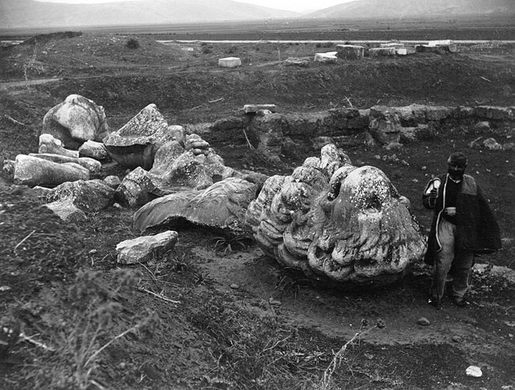
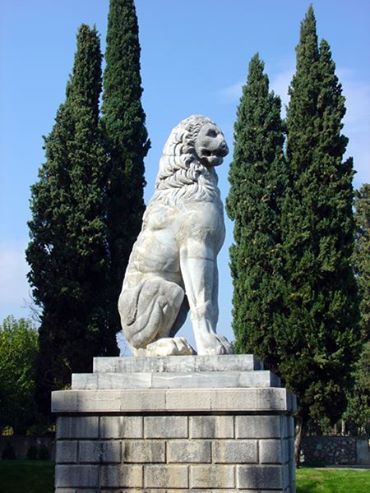
The Sacred Band of Thebes (Ancient Greek: Ἱερός Λόχος, Hierós Lókhos) was a troop of select soldiers, consisting of 150 pairs of male lovers which formed the elite force of the Theban army in the 4th century BC, ending Spartan domination. Its predominance began with its crucial role in the Battle of Leuctra in 371 BC. It was annihilated by Philip II of Macedon in the Battle of Chaeronea in 338 BC.
According to Plutarch, the 300 hand-picked men were chosen by Gorgidas purely for ability and merit, regardless of social class. It was composed of 150 male couples, each pair consisting of an older erastês (ἐραστής, "lover") and a younger erômenos (ἐρώμενος, "beloved"). Athenaeus of Naucratis also records the Sacred Band as being composed of "lovers and their favorites, thus indicating the dignity of the god Eros in that they embrace a glorious death in preference to a dishonorable and reprehensible life", while Polyaenus describes the Sacred Band as being composed of men "devoted to each other by mutual obligations of love".
Defeat came at the Battle of Chaeronea (338 BC), the decisive contest in which Philip II of Macedon, with his son Alexander the Great, extinguished Theban hegemony. The battle is the culmination of Philip's campaign into central Greece in preparation for a war against Persia. It was fought between the Macedonians and their allies and an alliance of Greek city-states led by Athens and Thebes. Diodorus records that the numbers involved for the two armies were more or less equal, both having around 30,000 men and 2,000 cavalry.
The traditional hoplite infantry was no match for the novel long-speared Macedonian phalanx: the Theban army and its allies broke and fled, but the Sacred Band, although surrounded and overwhelmed, refused to surrender. The Thebans of the Sacred Band held their ground and Plutarch records that all 300 fell where they stood beside their last commander, Theagenes. Their defeat at the battle was a significant victory for Philip, since until then, the Sacred Band was regarded as invincible throughout all of Ancient Greece. Plutarch records that Philip II, on encountering the corpses "heaped one upon another", understanding who they were, wept and exclaimed,
Perish any man who suspects that these men either did or suffered anything unseemly.
— Plutarch, Pelopidas 18
Pausanias in his Description of Greece mentions that the Thebans had erected a gigantic statue of a lion near the village of Chaeronia surmounting the tomb of the Thebans killed in battle against Philip.
In 1818, a British architect named George Ledwell Taylor spent a summer in Greece with two friends at Livadeia. On June 3, they decided to go horseback riding to the nearby village of Chaeronea using Pausanias' Description of Greece as a guidebook. Two hours away from the village, Taylor's horse momentarily stumbled on a piece of marble jutting from the ground. Looking back at the rock, he was struck by its appearance of being sculpted and called for their party to stop. They dismounted and dug at it with their riding-whips, ascertaining that it was indeed sculpture. They enlisted the help of some nearby farmers until they finally uncovered the massive head of a stone lion which they recognized as the same lion mentioned by Pausanias. Parts of the statue had broken off and a good deal of it still remained buried. It was later pieced back together in 1902 after obtaining permission from the Greek government.
In the late 19th century, excavations in the area revealed that the monument stood at the edge of a quadrangular enclosure. The skeletons of 254 men laid out in seven rows were found buried within it. A tumulus near the monument was also identified as the site of the Macedonian polyandrion where the Macedonian dead were cremated. Excavation of the tumulus between 1902 and 1903 by the archeologist Georgios Soteriades confirmed this. At the center of the mound, about 22 ft (6.7 m) deep, was a layer of ashes, charred logs, and bones about 0.75 m (2.5 ft) thick. Recovered among these were vases and coins dated to the 4th century BC. Swords and remarkably long spearheads measuring about 15 in (38 cm) were also discovered, which Soteriades identified as the Macedonian sarissas.
98 notes
·
View notes
Text
"15th of january, 1962, workers in Derveni Macedonia uncovered something incredible. A tomb from the halcyon days of the 4th century BCE, when phones still had cords, and wild Platos roamed the earth hunting dinosaurs for sustenance. Within the tomb was the massive and beautiful Derveni Krater, a golden urn containing the burned bones of a man and a woman. Atop one of the crypts, within the remains of a funeral pyre, was a papyrus scroll, dried by the flames, preserved in the macedonian heat."
Starting the section on Orphism today! (This quip was brought to you by my Wonderful Patreon Subscribers.)
292 notes
·
View notes
Photo

Lycia. Monumental tomb carved into the rock of 335 BC dedicated to a Macedonian king
252 notes
·
View notes
Text
Well then! And the lead should read “Macedonia Hetairos.” Hetairoi is plural. 🙄
#asks#ancient macedona#ancient macedonian tombs#archaeology#macedonian archaeology#ancient greece#greek archaeology
11 notes
·
View notes
Text
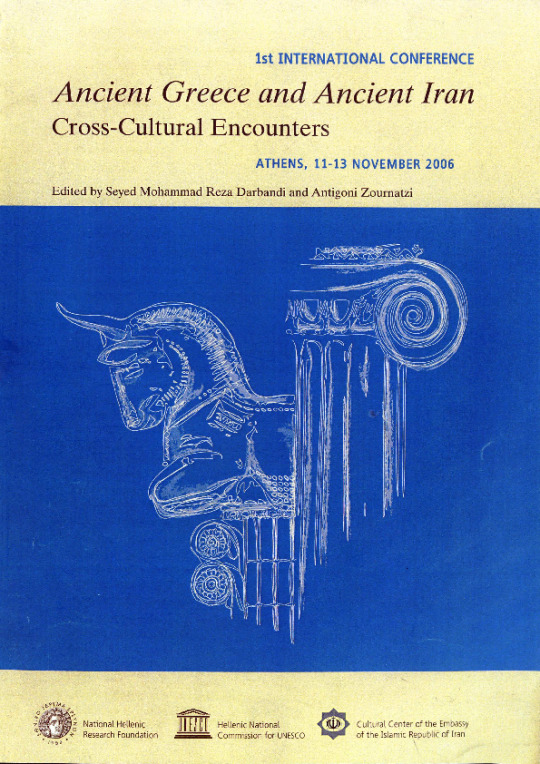
Ancient Greece and Ancient Iran: Cross‐Cultural Encounters
1st INTERNATIONAL CONFERENCE (ATHENS, 11‐13 NOVEMBER 2006)
Edited by Seyed Mohammad Reza Darbandi and Antigoni Zournatzi
National Hellenic Research Foundation
Cultural Center of the Embassy of the Islamic Republic of Iran in
Athens
Hellenic National Commission for UNESCO
Athens, December 2008
Description
The extraordinary feats of conquest of Cyrus the Great and Alexander the Great have left a lasting imprint in the annals of world
history. Successive Persian and Greek rule over vast stretches of territory from the Indus to the eastern Mediterranean also created an
international environment in which people, commodities, technological innovations, as well as intellectual, political, and artistic ideas could circulate across the ancient world unhindered by ethno-cultural and territorial barriers, bringing about cross-fertilization between East and West. These broad patterns of cultural phenomena are illustrated in twenty-four contributions to the first international conference on ancient Greek-Iranian interactions, which was organized as a joint Greek and Iranian initiative.
Contents
Preface (Ekaterini Tzitzikosta)
Conference addresses (Dimitrios A. Kyriakidis, Seyed Taha Hashemi Toghraljerdi, Mir Jalaleddin Kazzazi, Vassos Karageorghis,
Miltiades Hatzopoulos, Seyed Mohammad Reza Darbandi, Massoud Azarnoush, David Stronach)
Introduction (Seyed Mohammad Reza Darbandi and Antigoni Zournatzi)
Europe and Asia: Aeschylus’ Persians and Homer’s Iliad (Stephen Tracy)
The death of Masistios and the mourning for his loss (Hdt. 9.20-25.1) (Angeliki Petropoulou)
Magi in Athens in the fifth century BC? (Kyriakos Tsantsanoglou)
Hājīābād and the dialogue of civilizations (Massoud Azarnoush)
Zoroastrianism and Christianity in the Sasanian empire (fourth century AD) (Sara Alinia)
Greco-Persian literary interactions in classical Persian literature (Evangelos Venetis)
Pseudo-Aristotelian politics and theology in universal Islam (Garth Fowden)
The system Artaphernes-Mardonius as an example of imperial nostalgia (Michael N. Weiskopf)
Greeks and Iranians in the Cimmerian Bosporus in the second/first century BC: new epigraphic data from Tanais (Askold I.
Ivantchik)
The Seleucids and their Achaemenid predecessors: a Persian inheritance? (Christopher Tuplin)
Managing an empire — teacher and pupil (G. G. Aperghis)
The building program of Cyrus the Great at Pasargadae and the date of the fall of Sardis (David Stronach)
Persia and Greece: the role of cultural interactions in the architecture of Persepolis— Pasargadae (Mohammad Hassan Talebian)
Reading Persepolis in Greek— Part Two: marriage metaphors and unmanly virtues (Margaret C. Root)
The marble of the Penelope from Persepolis and its historical implications (Olga Palagia)
Cultural interconnections in the Achaemenid West: a few reflections on the testimony of the Cypriot archaeological record
(Antigoni Zournatzi)
Greek, Anatolian, and Persian iconography in Asia Minor: material sources, method, and perspectives (Yannick Lintz)
Imaging a tomb chamber: the iconographic program of the Tatarlı wall paintings (Lâtife Summerer). Appendix: Tatarli Project:
reconstructing a wooden tomb chamber (Alexander von Kienlin)
The Achaemenid lion-griffin on a Macedonian tomb painting and on a Sicyonian mosaic (Stavros A. Paspalas)
Psychotropic plants on Achaemenid style vessels (Despina Ignatiadou)
Achaemenid toreutics in the Greek periphery (Athanasios Sideris)
Achaemenid influences on Rhodian minor arts and crafts (Pavlos Triantafyllidis)
Historical Iranian and Greek relations in retrospect (Mehdi Rahbar)
Persia and Greece: a forgotten history of cultural relations (Shahrokh Razmjou)
The editors
Seyed Mohammad Reza Darbandi is General Director of Cultural Offices of the Islamic Republic of Iran for Europe and the Americas.
Antigoni Zournatzi is Senior Researcher in the Research Centre for Greek and Roman Antiquity, National Hellenic Research
Foundation. Her work focuses on the relations between Achaemenid Persia and the West.
The whole volume can be found as pdf on:
7 notes
·
View notes
Text
free summer reading groups in ancient studies
howdy <3 Saving Ancient Studies Alliance (SASA) in a volunteer-driven nonprofit that works to stimulate interest in the ancient studies and combat downward trends in humanities education across the globe. to support this mission, they're offering 16 FREE summer reading groups. check below the cut for more info.
Painted Stories: Reading Maya Mythology in Codex-Style Ceramics, June 1-29, Thursdays at 4PM EST: This reading group introduces participants to key mythological themes in Classic Maya (250-900 CE) material culture, particularly as seen on a subset of ceramic vessels known as "codex-style" vessels. No prior knowledge is necessary. RSVP HERE
The Alexander Romance, June 2-30, Fridays at 11AM EST: This reading group introduces participants to the ancient reception of Alexander the Great, with a focus on the Alexander Romance. Attend to join discussions of the ancient Macedonian hero through texts in translation. No prior knowledge is necessary. RSVP HERE
Is This Your Neighbor, Is This You? Looking at Others and Ourselves in Theoprhastus' "Characters," June 2-16, Fridays at 2PM EST: This reading group introduces participants to philosopher and natural scientist Theophrastus (371-287 BCE) and his thirty unsavory "Characters" inspired by real citizens of ancient Athens. Explore the ideas of stereotype and ethics, and examine modern methods of perception. No prior knowledge is necessary. RSVP HERE
Mother, Murderer: Medea's in Antiquity and Beyond, June 4- July 2, Sundays at 3PM EST: This reading group introduces participants to Medea, the infamous Colchian princess who endures in ancient mythology and beyond. Readings will range from Euripides and Ovid to Toni Morrison. Discussion will explore themes of revenge and gender studies. No prior knowledge is necessary. RSVP HERE
True Stories: Classical Sci-Fi and Fantasy, June 5-July 3, Mondays at 5PM EST: This reading group will introduce participants to the relationship between Classical works and the genre of science fiction. Discussions will explore similarities and differences through exciting themes of fictional empires, Roman utopia, and spaceships. No prior knowledge is necessary. RSVP HERE
Beyond the Silk Roads: June 8-July 6, Thursday at 9AM EST: This reading group will guide participants through the "Silk Roads" with a particular focus on Central Asia. Discussion will focus on pre-modern globalization, through primary source readings such as the Sogdian merchants' letters and Dunhuang texts. No prior knowledge is necessary. RSVP HERE
She's Just Not That Into You: Unrequited Love in Antiquity, June 8-July 6, Thursdays at 2PM EST:This Reading Group will guide participants through the theme of unrequited love in antiquity, and explore how tales of love and rejection are universal and timeless. Readings include translated texts of ancient poets, such as Sappho and Horace. No prior knowledge is necessary. RSVP HERE
The Pyramid Texts: The Earliest Egyptian Rituals, June 8-July 6, Thursdays at 3PM EST: This Reading Group will guide participants through the oldest religious literature in the world: the Ancient Egyptian Pyramid Texts. Discussions will explore beliefs and myths as present in the mortuary texts, and how they manifested in rituals. No prior knowledge is necessary. RSVP HERE
Tomb Robberies in Ancient Egypt: Prevention, Persecution, and Punishment, June 13-27, Tuesdays at 11:30AM EST:This Reading Group will introduce participants to the methods of Egyptology through primary texts and archaeological sources. With a focus on the Late New Kingdom, discussions will explore the questions of who and why involving tomb-robbing, and traditions of funerary practices. No prior knowledge is necessary. RSVP HERE
Atoms and Void: Lucretius' "On the Nature of Things," June 13-July 11, Tuesdays at 1PM EST: This Reading Group will introduce participants to the great Latin epic De Rerum Natura (On the Nature of Things), and its author Lucretius' key ideas of Epicureanism. Discussions will explore the poem's provocative ideas on pain and pleasure, and how they have impacted early modern science. No prior knowledge is necessary. RSVP HERE
Reading the Abbasid Past: History and Islamic Heritage, June 14-28, Wednesdays at 11AM EST:
This Reading Group will guide participants through the era of the Abbasid Caliphate, or the "Golden Age" of the Islamic World. Exploring a wide range of themes including science, philosophy, and art, discussions will explore the fascinating socio-political lives of the affluent Abbasids and their impact on present-day materials and heritage. No prior knowledge is necessary. RSVP HERE
Queer Lives and Loves in Ancient History, June 14-July 12, Wednesdays at 1PM EST: This Reading Group will use Queer Theory to explore and uncover evidence of LGBT+ lives in the Ancient World. Readings will involve Ancient Greek, Latin, and Near Eastern literature, and participants will be encouraged to challenge Western norms of identity, and modern approaches to historic interpretation. No prior knowledge is necessary. RSVP HERE
Curse Tablets: Personal Communications with the Dead and the Gods in the Ancient World, June 16-30, Fridays at 2PM EST:This Reading Group will explore the relatively unknown realm of curse tablets in the Ancient World. Through evidence left behind by women, men, and slaves over the span of 1,000 years in history, discussions will explore the motivations and consequences of such writings. No prior knowledge is necessary. (RSVP link broken)
Defying the Gods, and Forgotten Female Rage, June 18-July 30, Sundays at 11:30AM EST:This Reading Group will encourage participants to explore the representation of women in heroic tales through significant ancient texts such the Epic of Gilgamesh and Homer. Discussions will focus on the tragedy and anger of female characters in epics, who primarily appear as accessory to male heroism. No prior knowledge is necessary. RSVP HERE
From Harlots to Heroines: Royal Women in the Hebrew Bible, June 29-July 13, Thursdays at 12PM EST: This Reading Group will focus on three royal women in the biblical texts: Jezebel, Esther, and the female lover in the Song of Songs. Reading and discussions will explore primary sources, and how engendered narratives highlight writer bias and impact modern interpretations. No prior knowledge is necessary. RSVP HERE
Unlocking Beowulf, August 4-18, Fridays at 11AM EST:This Reading Group will explore Beowulf as a reflection of both the Norse and Anglo-Saxon worlds. Participants will gain a cultural and historical understanding of the poem, and explore various issues of identity, politics, gender, and nation-making in the Early Middle Ages. No prior knowledge is necessary. RSVP HERE
48 notes
·
View notes
Text
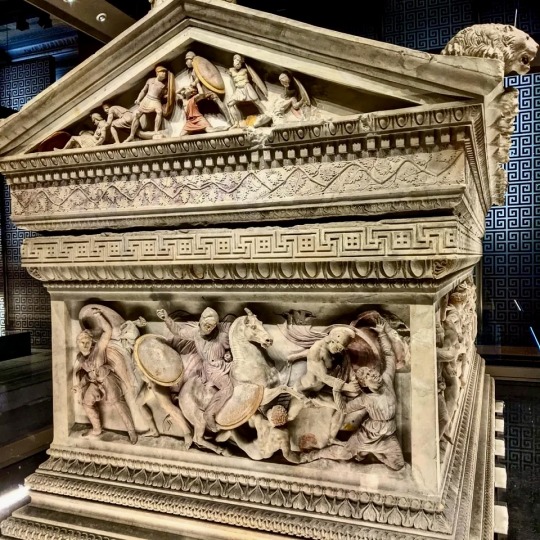





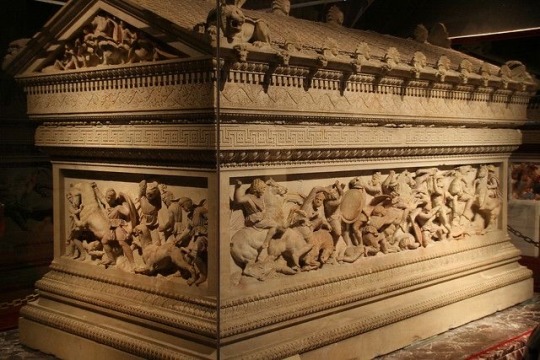
Sarcophagus of Alexander (4th century BC) built in marble in the shape of a Greek temple, it is decorated with bas-relief scenes of Alexander the Great. The funerary remains that it housed are not those of the Macedonian king, his tomb today is a mystery.
Archaeological Museum, Istanbul.
212 notes
·
View notes
Text
Can someone help me write a Percy Jackson prophecy for a fanfic i'm thinking? So basically a representative of Hestia (she's not her godly parent more like her godmother) with egyptian roots and a son of Hephaestus with latino roots (not leo, it's an oc) go on a quest to find the lost tomb of a macedonian-greek daughter of Aphrodite, Cleopatra (i invented that). They will travel the seas and face with egyptian gods to succeed with their quest.
#percy jackon and the olympians#percy jackson#pjo fandom#pjo series#percy jackson spoilers#writerscommunity#prophecy
10 notes
·
View notes